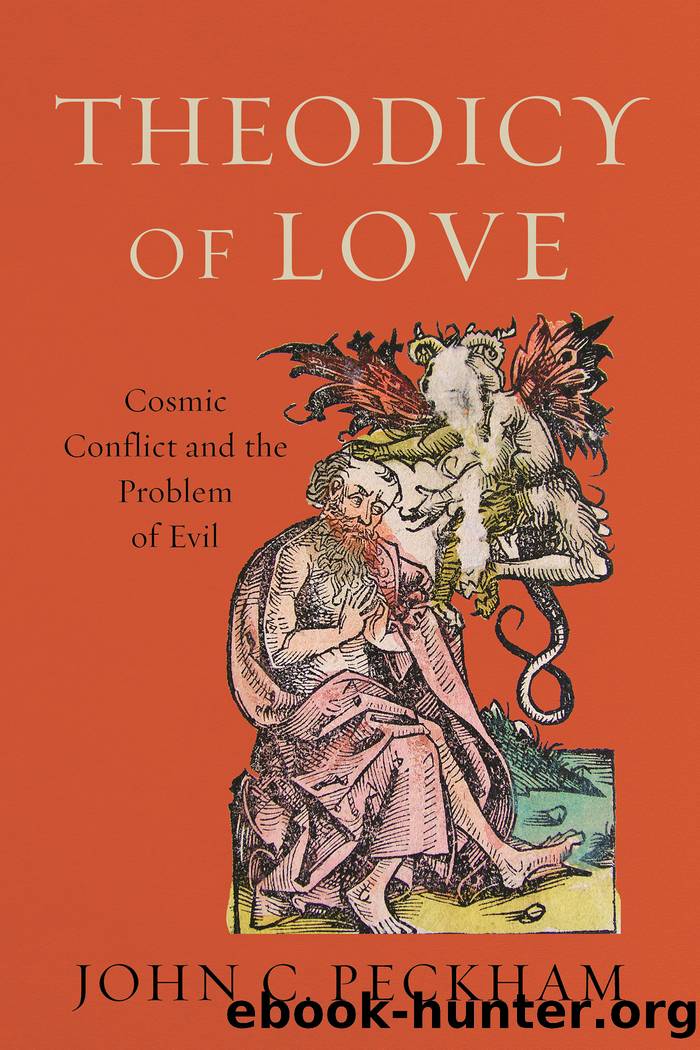Theodicy of Love by John C. Peckham

Author:John C. Peckham
Language: eng
Format: epub
Tags: Theology;Theodicy;Good and evil—Religious aspects—Christianity;God (Christianity)—Love;REL067000
ISBN: 9781493415762
Publisher: Baker Publishing Group
Published: 2018-09-04T00:00:00+00:00
The Rules of Engagement
Weâve seen so far that the cosmic conflict is primarily a dispute over Godâs character, prompted by demonic allegations against Godâs justice and rule. Insofar as God maintains his commitment to epistemic freedom, the use of force can do nothing to counter such allegations, so another strategy is required to meet the allegations. Thus in the case of Job, God allows such allegations to have a hearing before the heavenly council and to be put on display so that creatures can make their own decisions. Toward answering such cosmic allegations, God allows Satan parameters within which he might make his case.
In order for a finite being to be able to make such a case against the omnipotent God, there must be consistent parameters within which that finite being is allowed to operate. The finite being must be granted some jurisdiction that the omnipotent being covenants not to override. This is just what we see in Job 1â2. Satan is initially restricted and later brings requests to the heavenly council to have more license to demonstrate his charges. This evinces not only that Satan works within limits that are known to him and to God but that these ârules of engagementâ can be modified by agreement before the heavenly council. Insofar as God covenants to act or refrain from acting in a certain way, he is morally bound to do so. Given such covenantal ârules of engagement,â then, Godâs action is (morally) restricted.74
To understand this line of thought further, suppose that love requires free will of the kind suggested in chapter 2 of this book, which includes epistemic freedom to trust or distrust God. In his response to demonic allegations against his character, then, God could not immediately bring about a state of affairs wherein everyone freely recognizes his perfect goodness and love. Demonic allegations call for rules of engagement that provide the parameters in which the allegations could be proven true or false via demonstration. Accordingly, God covenants to allow the devil a specified jurisdiction, including agreed on parameters within which to work, which I am calling covenantal rules of engagement. The description of these rules of engagement as covenantal means they are part of a bilateral agreement between parties that effectively limits the action of both and that neither party can unilaterally change.
This framework allows us to make sense of the many passages in Scripture where Godâs action appears to be restricted and, conversely, where the power and authority or jurisdiction of the kingdom of darkness appears to be quite robust. Alongside the case of Job, Daniel 10 presents a striking instance of such rules of engagement. Therein an angel of God is delayed for three weeks because the prince of Persiaâapparently a celestial ruler behind the earthly ruler of Persiaâwithstood him (vv. 12â13; cf. 10:20â21).75 As Longman puts it, âThough the divine realm heard and began responding immediately to Danielâs prayers three weeks earlier, there was a delay because of a conflict, an obstacle in the form of the âprince of the Persian kingdomâ (v.
Download
This site does not store any files on its server. We only index and link to content provided by other sites. Please contact the content providers to delete copyright contents if any and email us, we'll remove relevant links or contents immediately.
The Secret Power of Speaking God's Word by Joyce Meyer(3135)
Signature in the Cell: DNA and the Evidence for Intelligent Design by Stephen C. Meyer(3114)
Real Sex by Lauren F. Winner(3000)
The Holy Spirit by Billy Graham(2931)
The Gnostic Gospels by Pagels Elaine(2515)
Jesus by Paul Johnson(2347)
Devil, The by Almond Philip C(2318)
23:27 by H. L. Roberts(2236)
The Nativity by Geza Vermes(2217)
Chosen by God by R. C. Sproul(2147)
All Things New by John Eldredge(2145)
Angels of God: The Bible, the Church and the Heavenly Hosts by Mike Aquilina(1948)
The Return of the Gods by Erich von Daniken(1920)
Angels by Billy Graham(1913)
Knowing God by J.I. Packer(1841)
Jesus of Nazareth by Joseph Ratzinger(1795)
The Gnostic Gospel of St. Thomas by Tau Malachi(1778)
Evidence of the Afterlife by Jeffrey Long(1772)
How To Be Born Again by Billy Graham(1770)
